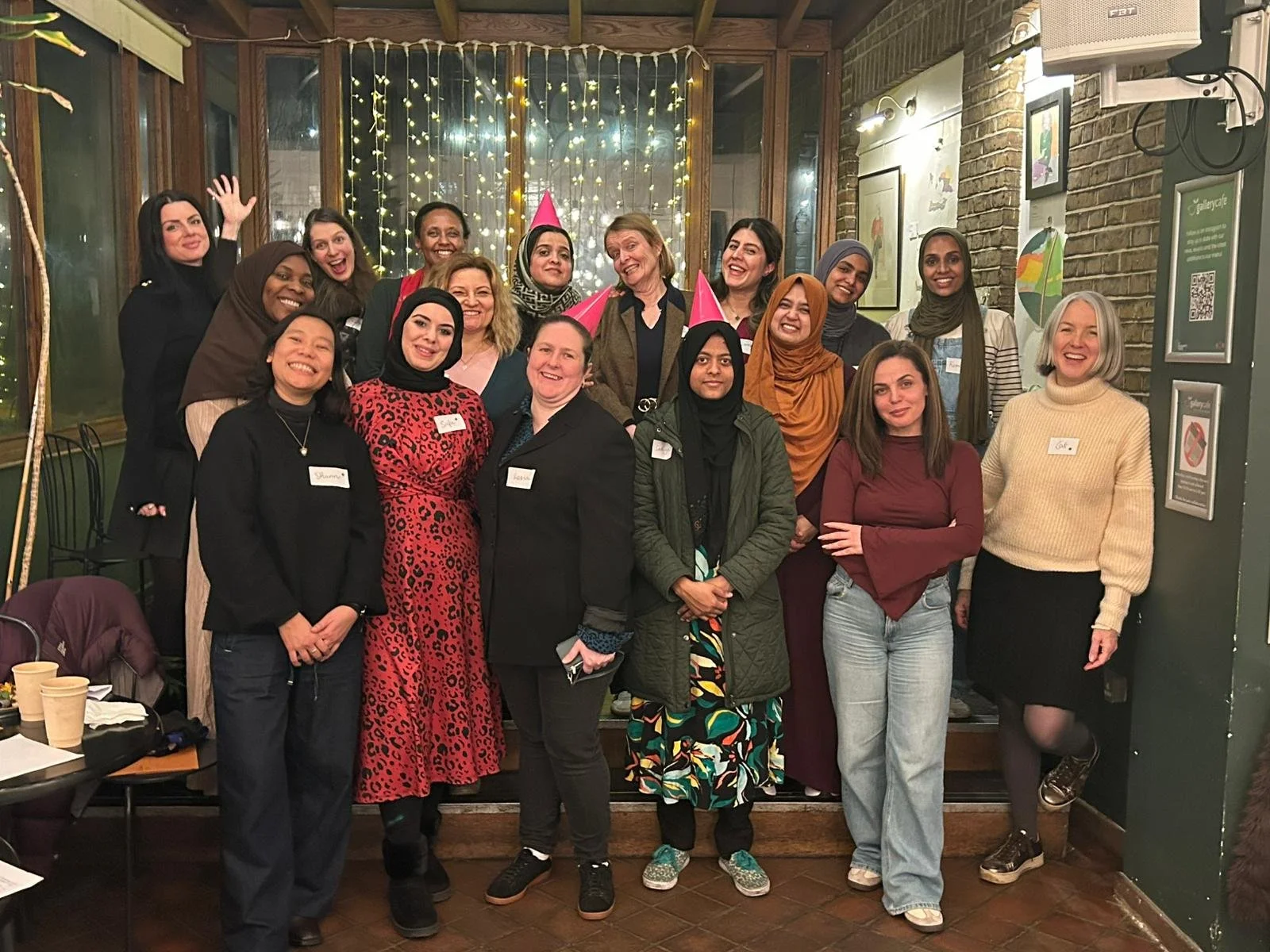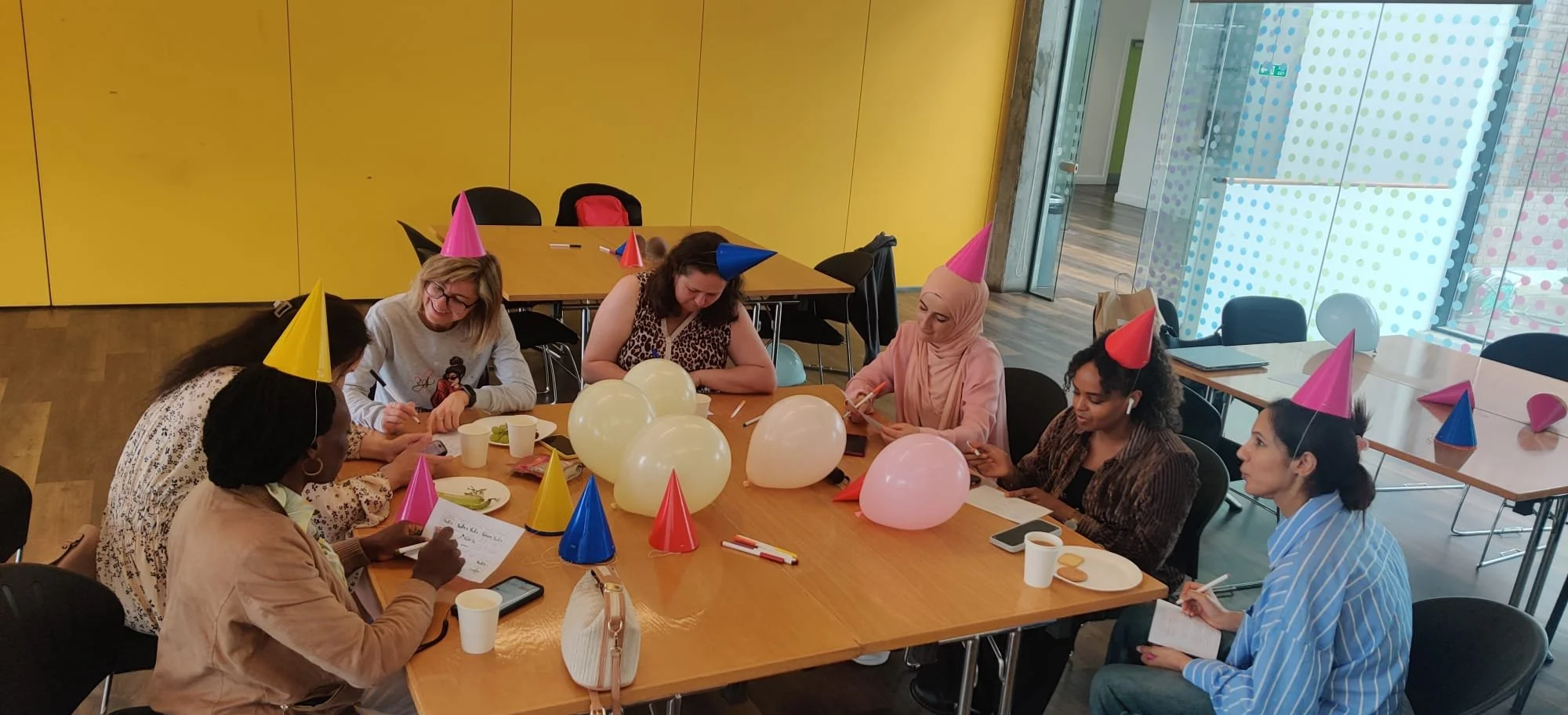Motherhood and mentoring: Migerjana & Tiffany
Migerjana & Tiffany were paired as Mentor and Mentee on our April - August 2022 cohort. In this blog, they explain why being a mother won’t hinder your ability to join the Routes Mentoring Programme. And Migerjana shares her top tips on how to juggle motherhood and being a mentee.
This piece has been written by Migerjana and Tiffany (photographed) as part of their mentoring journey.
Like other young mums, Migerjana first heard about the Routes Mentoring Programme through the Happy Baby community, a charity that helps women who are pregnant or have young children and who have fled their country to seek international support in the UK. She has been volunteering her time at the charity every Wednesday for the past 10 months.
What has Migerjana’s journey been in the UK so far?
Migerjana moved to the UK to seek asylum when she was 5 months pregnant with her daughter. She then spent several months in a hotel in London with other pregnant women, also asylum seekers. Shortly after giving birth, she moved into a house share, where she’s been living since.
She joined the Routes Collectives mentoring Programme in April, when her daughter was 11 months old.
“At the beginning, I was sceptical and I wasn’t sure if I should join the programme because of my little daughter. I wasn’t sure if I would be able to commit to the whole programme and when I could fit in all of the sessions with my mentor. But now that I am part of the programme, I believe that it was a great decision to make! I’m really grateful and thankful that I enrolled in this programme. I’m building self confidence and I am feeling hopeful that I can provide a great future for my daughter and I. There is a long journey ahead of us but this programme has enabled me to believe in myself again!”- Migerjana.
Other mentees such as Martha said that the programme felt like a “wake up call” reminding her that “she has a purpose’’, and Zhaneta who was expecting a child in 2020 said that she felt “more peaceful” thanks to the programme.
How do busy mums like Migerjana manage to participate in the programme?
As you will have seen in other blogs on the Routes website, both the mentors and mentee undergo training and they meet up for 10 sessions either face-to-face or remotely over the course of the 4 months programme. This may sound like a lot of time for mothers who do not have childcare in place. Migerjana was delighted when her roommate volunteered to look after her daughter for both training days. She and Tiffany agreed to schedule all of their weekly meetings remotely during her daughter’s naps, which enabled Migerjana to concentrate on her objectives and have a bit of the ‘me time’ that mums sometimes crave! Obviously there were days when her daughter wasn’t sleeping and it was fine – either they would do a short session, or play a bit with the little one.
For Tiffany, who is also a mum, it was very important that Migerjana felt comfortable. She knows too well how stressful it can be when trying to multitask with a toddler or baby!
What is Migerjana’s objective?
During the first few sessions, Tiffany and Migerjana discussed Migerjana’s current situation and her medium to long-term objectives. In the asylum system, it can take years for people to get a work permit. Migerjana has applied for one, but has yet to receive an answer. Thus they decided to concentrate on finding a short-term online course that could help Migerjana find suitable employment once she is granted a work permit.
As a young mum, it is important for Migerjana to do a self-paced online course. This means that she can study whenever she can in the comfort of her home.
As of today, her plan is to do a short online course to acquire business skills with a local college, then if she likes this field of work, undertake a longer course in the autumn.
How are courses funded?
There are numerous funding opportunities available. On this occasion, Tiffany and Migerjana have been focusing on two funding opportunities:
The bursary scheme from the City & Guild Foundation that provides support of up to £10,000; and
Funding at a local college for asylum seekers who enrol in a university degree.
Hopefully, they’ll be able to secure funding so that Migerjana can start a course soon!
Migerjana’s top 5 tips on how to juggle motherhood and the mentoring programme:
Agree on a day when you are both available.
“I have therapy on Tuesday and I volunteer at the Happy Baby community on Wednesdays. The rest of the week I am out and about with my daughter. So Tiffany and I decided that Fridays during my child’s nap was a good time to have online hour-long sessions.”
It’s ok not to be ok!
“We’ve both had to cancel sessions at the last minute because either of our babies was unwell. It happens and it’s fine!”
Mentors are called ‘champions’
“This means that they do not always have an answer to our questions, but they always strive to find ways to help with suggestions and by bringing a different perspective.”
Don’t hesitate to challenge yourself and join the programme!
“Ever since Tiffany and I met (online), I have felt like I’ve known her for a long time. Every session with my mentor brings me closer to my goals. I feel more positive and hopeful for the future!”
Being a mum is not a barrier, it is a superpower!
“I really want my daughter to have the best possible opportunities in life. That is a very powerful incentive and it makes me work extra hard!”
What is it like to be a mentor?
Below is a short testimony from Tiffany, who’s child is 2-and-a-half years old.
“Being a mentor is a human adventure before anything else. Whilst it provides mentors with greater listening skills, a better understanding of the asylum system in the UK and numerous tools to help a mentee achieve their objectives, it really is the bond that you develop with your mentee that matters the most. In her blog, another mentee called Xiaojuan describes really well this feeling of connection between a mentor and a mentee.
“Being a mother is a permanent juggling act and it is easy to understand why ‘it takes a village to raise a child’! Getting to know Migerjana and her daughter got me thinking about my own experience of bringing my son up. The mother-daughter bond that they have is truly exceptional and I feel very inspired by the community that they have created for themselves with other mothers and children in the asylum system and beyond. I believe that it shows that motherhood has no cultural, religious or ethnic boundaries.
“Being Migerjana’s mentor has been a privilege. I’m in awe of her resilience and her ability to adapt. She is an incredibly talented young woman who completed a masters degree in political science in her country and is raising a child by herself in a foreign country. Yet she has very little self confidence and the feeling of starting from scratch in an environment where your degrees are not recognised can be a daunting prospect. I am delighted to be helping her achieve her objectives!”
Written by Migerjana and Tiffany, August 2022




















